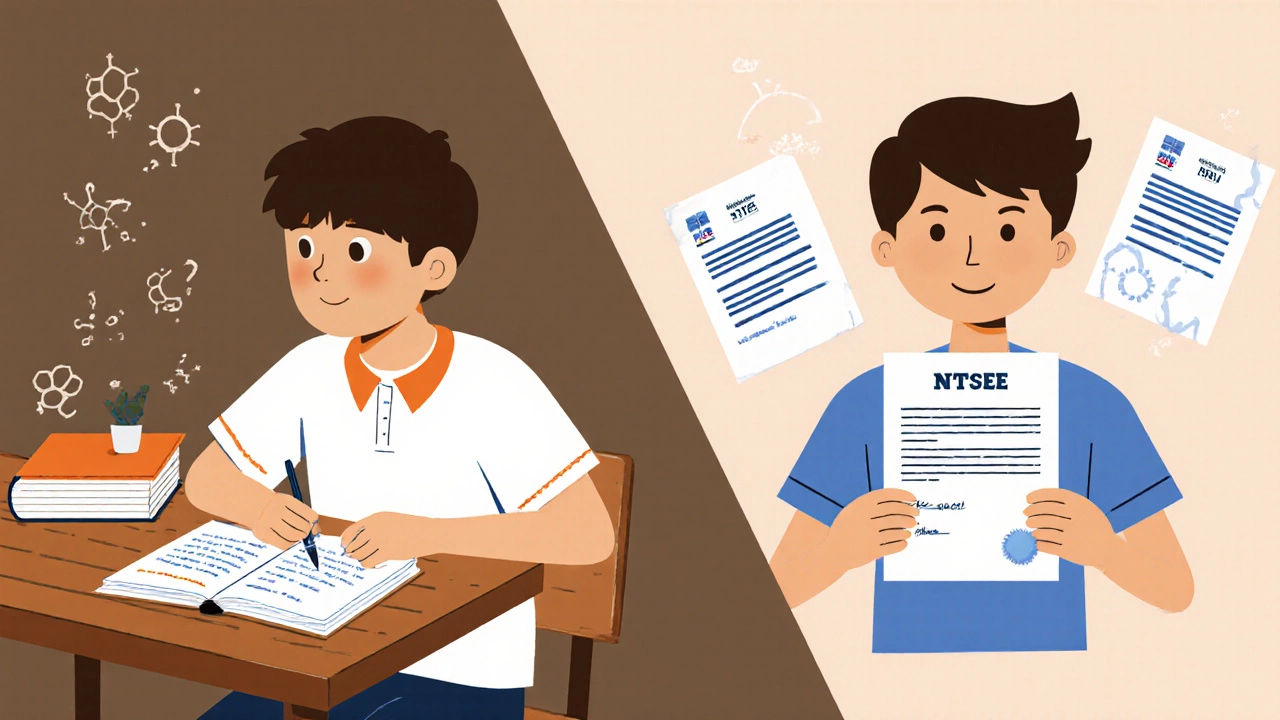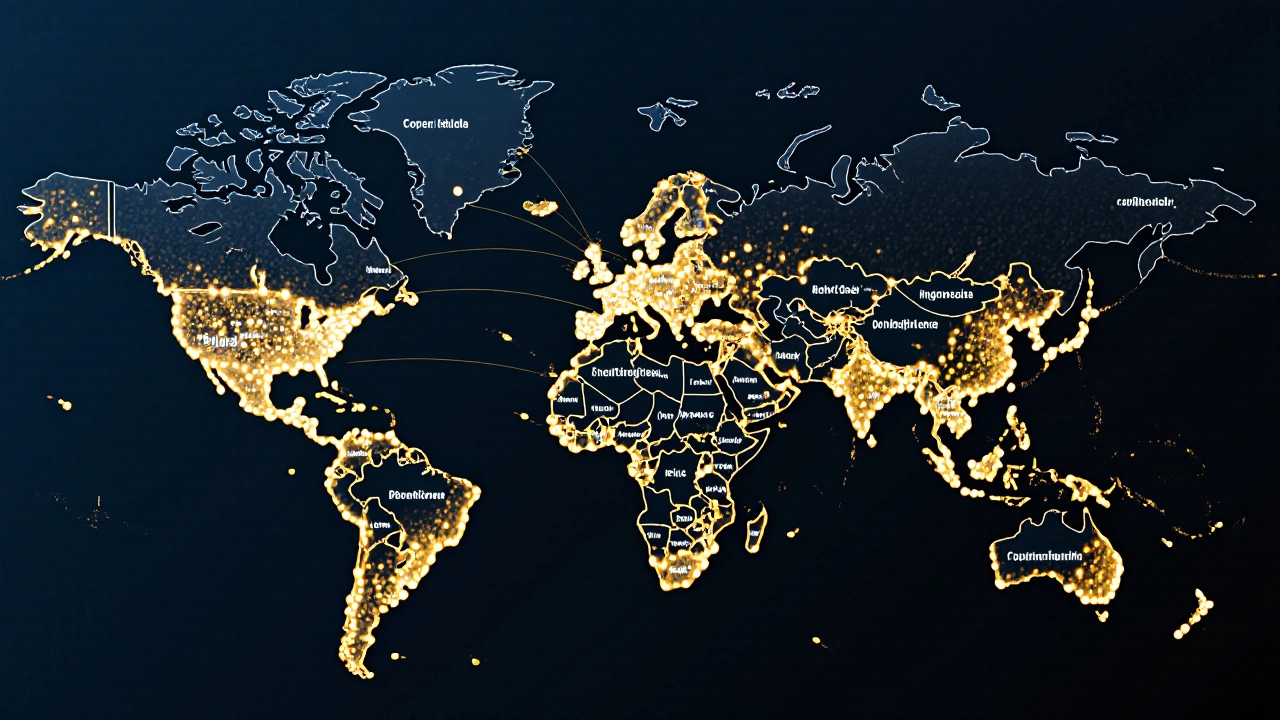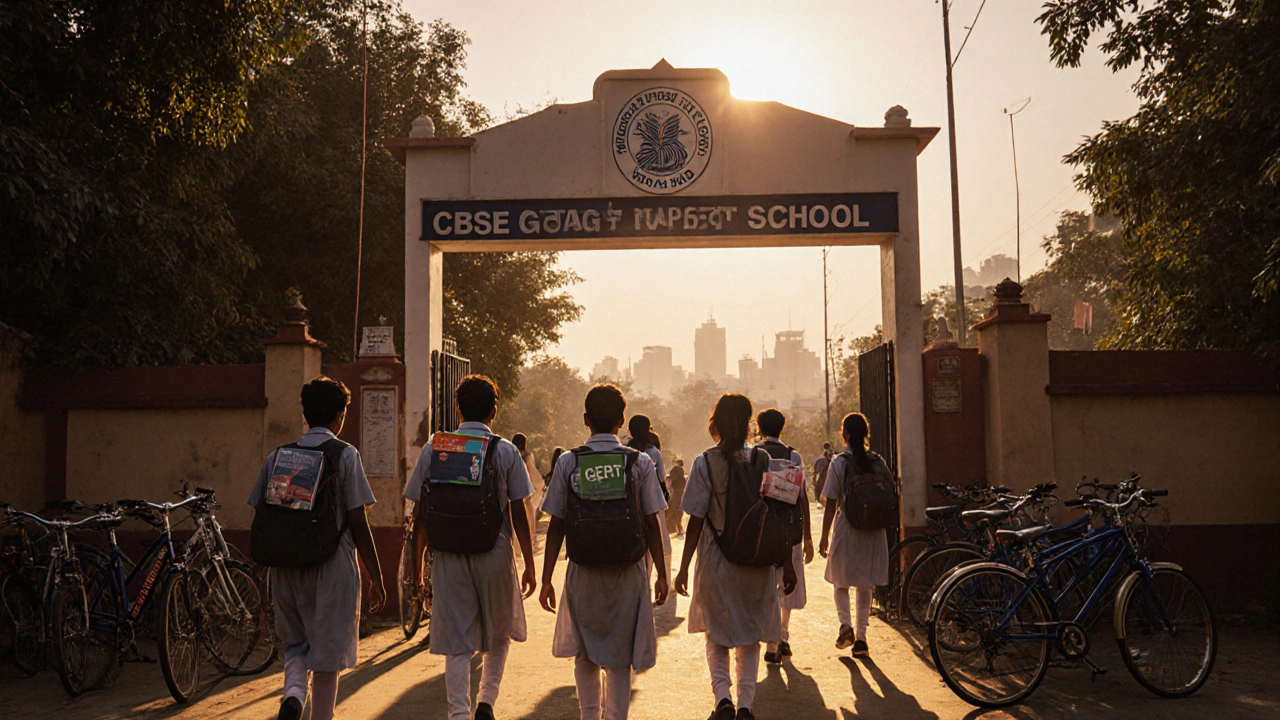When you walk into any Indian city - from Jaipur to Jhansi, from Coimbatore to Chandigarh - you’ll see the same logo on school gates: CBSE. It’s not just a board. It’s the default choice for millions of families across India. If you’re wondering which school is very popular in India, the answer isn’t a single school. It’s the system: the Central Board of Secondary Education.
Why CBSE Dominates Indian Schools
Over 20,000 schools in India and 240 schools abroad are affiliated with CBSE. That’s more than ICSE, state boards, and IB combined. Why? Because CBSE doesn’t just teach - it prepares students for national exams. The board’s curriculum is designed with one goal: to make students ready for competitive exams like JEE, NEET, and NTSE.
Take a look at any engineering or medical college entrance list. Over 80% of the top rankers come from CBSE schools. That’s not a coincidence. CBSE’s syllabus is streamlined, predictable, and aligned with the National Curriculum Framework. It focuses on core subjects - Physics, Chemistry, Math, Biology - with clear weightage and exam patterns that match national tests.
Parents don’t choose CBSE because it’s the fanciest. They choose it because it works. If your child wants to crack IIT or AIIMS, CBSE is the fastest track. It’s the only board where NCERT textbooks are mandatory. And those textbooks? They’re the exact same ones used by UPSC and other government exam prep platforms.
How CBSE Compares to Other Boards
Let’s be clear: ICSE is more detailed. State boards are more regional. IB is more international. But none of them match CBSE’s scale or exam alignment.
Here’s what sets CBSE apart:
- Exam structure: CBSE uses a standardized pattern across all schools. One paper, one marking scheme. No surprises.
- NCERT focus: Every question in Class 10 and 12 board exams comes from NCERT books. No extra reference books needed.
- Language flexibility: Students can take exams in English, Hindi, or regional languages. That’s not true for ICSE.
- Transferability: If your family moves from Delhi to Bangalore, CBSE ensures your child doesn’t fall behind.
Compare that to ICSE, which has heavier English requirements, more internal assessments, and a broader but less exam-focused syllabus. Or state boards like Maharashtra’s SSC or West Bengal’s WBCHSE - they’re great locally, but don’t prepare students for national-level exams.
What Students Actually Learn in CBSE
CBSE isn’t about memorizing facts. It’s about building problem-solving skills. In Class 9, students start learning how to apply formulas in real-world contexts. In Class 10, they solve numerical problems in Physics and Chemistry that mirror JEE Mains questions. By Class 12, they’re practicing past papers from the last 15 years - the same ones used by coaching centers across the country.
For example, in Chemistry, CBSE Class 12 students study organic reaction mechanisms in depth - the exact topics tested in NEET. In Math, they master calculus and matrices - the foundation for engineering entrance exams. Even subjects like Social Science are structured around national events and constitutional concepts, making them relevant for UPSC prep later on.
And here’s the kicker: CBSE doesn’t punish students for small mistakes. The marking scheme rewards steps, not just final answers. That’s why students who struggle with rote learning often do better under CBSE than under other boards.

Who Benefits Most from CBSE?
CBSE isn’t for everyone - but it’s perfect for certain families.
- Families planning for engineering or medicine: If your child’s goal is IIT, NIT, AIIMS, or any top medical college, CBSE is non-negotiable.
- Military or government transfer families: If your parent works in the armed forces, PSU, or government service, CBSE ensures continuity no matter where you’re posted.
- Students aiming for national scholarships: NTSE, KVPY, Olympiads - all use CBSE syllabus as the baseline.
- Students in tier-2 and tier-3 cities: CBSE schools are more affordable and widely available than IB or Cambridge schools. You don’t need to live in a metro to get a quality CBSE education.
It’s not the best board for kids who love literature, art, or creative writing. If your child wants to study journalism, design, or fine arts abroad, IB or ICSE might be better. But for 90% of Indian students aiming for high-stakes national exams, CBSE is the only realistic option.
The Real Cost of Choosing CBSE
Some say CBSE is too rigid. That it ignores creativity. That it pushes rote learning.
Here’s the truth: CBSE doesn’t cause rote learning. The coaching culture does. CBSE gives you the syllabus. How you teach it - that’s up to the school. There are CBSE schools that encourage project-based learning, debates, and science fairs. And there are others that turn classrooms into exam factories.
The difference? Teacher quality and school leadership. A good CBSE school uses NCERT as a base - then builds projects, labs, and real-world applications on top. A bad one just drills past papers.
That’s why you can’t judge CBSE by the board alone. You have to look at the school. Ask: Do they have a science lab that’s actually used? Do students present projects? Are teachers trained in NCERT pedagogy? If yes, CBSE becomes a powerful tool. If no, then any board will feel like a grind.

What Happens After Class 12?
CBSE doesn’t end at the board exam. It opens doors.
Every major engineering college in India - IITs, NITs, IIITs - accepts CBSE scores directly. So do medical colleges under NEET. Even private universities like Amity and SRM use CBSE marks for admission.
And if you’re thinking about studying abroad? CBSE is recognized in the US, UK, Australia, Canada, and Germany. You’ll still need IELTS or TOEFL, but your 12th-grade marks are accepted without extra verification - unlike some state boards.
That’s why CBSE students dominate Indian university admissions. In 2024, over 72% of students admitted to IITs came from CBSE schools. The number is even higher for medical seats - nearly 85%.
Is CBSE the Right Choice for Your Child?
Ask yourself these questions:
- Does your child want to pursue engineering, medicine, or a government job?
- Are you likely to move cities in the next 5 years?
- Do you want a curriculum that’s transparent, nationally recognized, and exam-focused?
If you answered yes to any of these, CBSE is your best bet. It’s not glamorous. It’s not trendy. But it’s the most reliable system in India for getting your child into top colleges.
If your child is more artistic, loves literature, or plans to study design or humanities abroad - then consider ICSE or IB. But if you’re playing the long game - and most Indian families are - CBSE is the board that gives you the clearest path forward.
Is CBSE easier than ICSE?
CBSE is not necessarily easier - it’s more focused. ICSE has more subjects, heavier English requirements, and more internal assessments. CBSE has fewer subjects but deeper focus on core areas like Math and Science, which align with national exams. For students aiming for JEE or NEET, CBSE’s structure is more efficient.
Can a CBSE student switch to ICSE or IB later?
Yes, but it’s challenging. CBSE students moving to ICSE or IB in Class 11 often struggle with the sudden shift in teaching style - more essays, projects, and critical thinking. The syllabus changes completely. It’s doable, but only if the student is adaptable and the school provides strong transition support.
Are CBSE schools more expensive?
Not necessarily. CBSE schools range from affordable government-aided institutions to premium private ones. The cost depends on location and infrastructure, not the board. You can find quality CBSE schools for under ₹50,000/year in many cities. IB schools, by contrast, often cost ₹2 lakh or more.
Do CBSE schools teach English well?
Yes, but differently. CBSE focuses on grammar, comprehension, and writing for exams. It doesn’t emphasize fluent speaking as much as ICSE or IB. However, many top CBSE schools now add spoken English programs, debate clubs, and public speaking workshops to bridge the gap.
Is CBSE accepted internationally?
Yes. CBSE Class 12 certificates are recognized by universities in the US, UK, Canada, Australia, Germany, and Singapore. Students need to submit transcripts and sometimes take standardized tests like SAT or IELTS, but CBSE is not treated as a lesser qualification. Many Indian students from CBSE schools get into top global universities every year.
What Comes Next?
If you’re choosing a school today, don’t get distracted by flashy buildings or Instagram-worthy campuses. Look at the results. Ask: Where do their students go after Class 12? Are they getting into IITs? Medical colleges? National scholarships?
The most popular school in India isn’t a single building. It’s the CBSE system - quiet, consistent, and built for results. It’s the backbone of India’s education landscape. And for the majority of families, it’s the only choice that makes sense.
